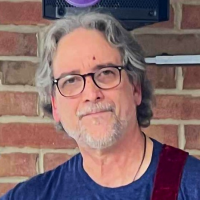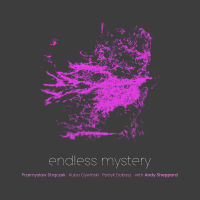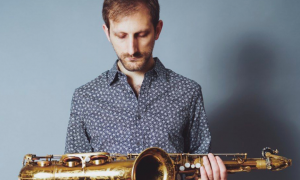Home » Jazz Articles » Interview » Gary Husband: The Gemini Dimension
Gary Husband: The Gemini Dimension
GH: Yeah, there is a certain solitude about it—the piano and the guitar—that I think is nice, particularly on the last one with Markus Reuter. That one happened on the back of the first day of lockdown in Japan. It literally was the first day everything closed. I was over there playing with Stick Men and our whole tour—with the exception of the first night, which was recorded—just disintegrated bit by bit leading up to that. Life was unrecognizable from that point on. We were walking around in these almost-deserted streets and had nothing to do. Everyone was looking to get the first flight home they could. Then [Moonjune Records head] Leonardo Pavkovic, being the enterprising soul that he is, said, " I'm going to find a studio for you two guys, and let you go. Someone has to document this madness." (laughs) So we went in and had to do very little except switch on machines and listen to each other. He [Reuter] had this way of playing a layer over what I was playing on piano and then playing back to me what I had just played. It was really neat and conducive to invention, in the moment. So that album [Music of Our Times (Moonjune, 2020)] was done in about an hour and twenty minutes. I thought it was really cool that we were in the company of someone who had the vision to bring that together. I probably would have never thought to have done it on my own. Maybe some situations like that don't always work out as well as others but sometimes it just pays off—maybe just for the sheer joy of being given the opportunity to do that kind of thing with the right people.
AAJ: Your role in the 4th Dimension and on these collaborations over the last decade or so, you have been almost exclusively playing keyboards. Do you ever find your drums-side and keyboard-side vying to be the dominant mode of expression in you?
GH: One over the other, you mean? No.
AAJ: Really?
GH: No, because they're inextricably linked in me and always have been. The development of each one seems to have taken place just hand in hand with the other one. I mean, I don't understand it. There are obvious ways they inform each other. The drums offer a hand and limb independence that facilitates what I do on piano. With the piano, writing, composing, and arranging offer insight into the shape, dimension, and conception of how we speak on drums. Also, I benefit continually from drums from a better sense of rhythmic articulation, which is as crucial an element in the way I play piano as it is drums. All the musical inspirations I connected with most have great rhythm and timing. It's something I've recognized in everyone I've loved and I was determined to cultivate that for myself.
I spoke to Chick Corea about this on a filmed conversation we had. He was fascinated by the whole piano and drum marriage thing. And he played drums too, kind of Barry Altschul style—very creative and abstract, very out there. You see with him, I was fortunate in that we play a lot of festivals with the 4th Dimension and those are really an opportunity where we meet other musicians—they hear us and we hear them. That's so great for us, and it so happened at a couple of these festivals Chick had been on the side of the stage watching us saying, "Man, you go back to drums and then go to piano again? That's exactly what I want to do!" (laughs) So he started referring to me as "Piano And Drums." Anyway, during the lockdown, he writes and says, "Hey, Piano And Drums, what's shakin'? Do you fancy maybe having a bit of creative fun with doing some file sharing together?" So we both started with little ideas, taking those and each developing on them and introducing new sections, recording stuff where he would play his drums, then I would play drums and we would both play piano, synths, and stuff, and towards the end sections he was on marimba and me on acoustic guitar! When we were done we had around 12 minutes of material that we just had built, sending files back and forth to each other. We released it on Youtube and it's on my website. We called it "Lockdown Throwdown." It was all pretty lo-res, but we just had tons of fun making that. Chick said he definitely wanted [to put] it out because it was like nothing he was doing or had done with anyone else. I just said, "Sure! Are you kidding!? Yes absolutely!."
He was just really, really sweet to me. He would call me all hours of the night and we'd talk about Roy Haynes' ride cymbal and different drummers, or Bud Powell and I loved it. And then the phone calls just stopped. He went quite shortly after that. [What we did] must have been one of the last things he'd done. Seems so weird to think..and he was so alive... right to the end.
AAJ: Wow, that makes what you did together all the more precious.
GH: Yeah, those calls and that little recording are among the most special memories I will cherish forever. There's something very poignant about how that came about—finding each other and striking up a relationship like that, only to last less than a year, but...
AAJ: That's quite something that you and he bonded over those things and that Corea was so enthusiastic about wanting to do what you do---playing both keyboard and drums in performance. There are a few other musicians these days—such as Josh Dion and Nate Wood—that take it a step further and incorporate keyboards into their live drum setup, playing them simultaneously. Is this a notion you have entertained at all?
GH: Well according to Leonardo [Pavkovic of] Moonjune, there is a project that is going to become a reality and we're going to record it. (laughs) I haven't said an absolute yes yet... (laughs) Actually I have done some writing for it that frees me up to do right-hand passages when I play this side, left-hand passages for some bass synth on this side, with my feet on a double pedal. I already did some performances this way, but I have yet to get on with it—work and develop the facility and so forth. It's the Gemini thing again, but we will do it I think. It's interesting. Watching Nate do what he does---though it's different from how I feel to do it—makes me almost say, "No, forget it." I mean, he's got his kit with the keyboard and the bass! So, you know, what am I going to do? (laughs) He's ridiculous...
AAJ: Well there are some people who are talented enough to express themselves through multiple instruments, but not all of them are given to multi-tasking. Some are quite immersive and need to commit to one avenue at a time.
GH: Well I do understand the need for that focus, but I was into the two very, very early in my life. What could I do!? The development of them both simultaneously just fell into place, and believe me I encountered a lot of resistance to the very idea of pursuing two different instruments when I was young—from mentors and experienced musicians I admired alike. They would say, "You're going to have a real problem with this because nobody knows how to place you. You have to be one or the other. It's just not going to work out for you to be both." And I would say, "It has to... it's the only way I know."
I mean, I know there's a price for that and I see how people view me in different ways. But I've always had to accept life not being easy in order to have the benefits and fulfillment [of being a dual-instrumentalist]. For me, it works! If I think of a circle, these instruments are two halves that make it a whole. There's a line down the middle representing a physical shift in terms of application, but It makes complete sense to me to have them both, and have them both as my primary instruments. That's just the way it is for me.
I really got it from all sides when I was young. If you wanted to be considered a "jazz" musician. you just didn't go and play fusion gigs. It was against the rules. The leader of the big band I began my professional career with on drums told me "You're a big band drummer who plays piano on the side." Then others told me, "You play great drums but you'll always be a pianist." And, as I found out to my peril, moving around [between genres and instruments] was the key to not getting a gig. I mean I was doing some studio work but I just found out why I hardly ever got called [to work on sessions] all the way through the 80s: [imitating] "You were playing this audacious and wild improvised music with Allan Holdsworth at deafening volumes. And you wonder why you didn't get sessions?" It was somebody I respect very much who enlightened me to this. And that was the attitude. People wouldn't accept I had two main, principal instruments without a lot of difficulty, and the fact I moved around too many varying genres of music was definitely a no-no.
AAJ: Well fortunately, there's probably little need for you to pay attention to the "prevailing wisdom" anymore.
GH: Yeah, well they still tell me that I haven't figured out what I want to do when I grow up, but I guess I just haven't grown up yet. (laughs)
My one truth—and the thing I can remember being most paramount from day one—is music, and that music meant everything to me. It's an incredible thing to realize this more and more, at the age I am now, and to know that it was always this way. I wouldn't recognize life if it wasn't full of music, and the cherished opportunity we have to speak through it, of it, in it. I'm drunk with love for it: the precious, mysterious, magnificent, and life-affirming gift that it is. What a blessing. Along with love, it's the one transcending thing in this world. Music survives everything, doesn't it?
Tags
Interview
Gary Husband
Mike Jacobs
Allan Holdsworth
john mclaughlin
Chick Corea
Bill Evans
Etienne Mbappe
Ranjit Barot
Kenny Wheeler
Michael Brecker
Wayne Shorter
Albert Ayler
George Adams
Joni Mitchell
Vince Mendoza
Shirley Horn
Tony Williams
Miles Davis
Steve Topping
Mahavishnu Orchestra
Weather Report
Souvik Dutta
Jim Beard
Matt Garrison
randy brecker
Arto Tuncboyaciyan
Elliot Mason
Jerry Goodman
Bjork
Burt Bacharach
John Cage
Carlos Jobim
Tony Roberts
Danny Thompson
Sandy Brown
Alex Machacek
mark wingfield
Markus Reuter
Stick Men
Leonardo Pavkovic
Barry Altschul
Roy Haynes
Bud Powell
Josh Dion
Nate Wood
PREVIOUS / NEXT
Support All About Jazz
 All About Jazz has been a pillar of jazz since 1995, championing it as an art form and, more importantly, supporting the musicians who make it. Our enduring commitment has made "AAJ" one of the most culturally important websites of its kind, read by hundreds of thousands of fans, musicians and industry figures every month.
All About Jazz has been a pillar of jazz since 1995, championing it as an art form and, more importantly, supporting the musicians who make it. Our enduring commitment has made "AAJ" one of the most culturally important websites of its kind, read by hundreds of thousands of fans, musicians and industry figures every month.





















